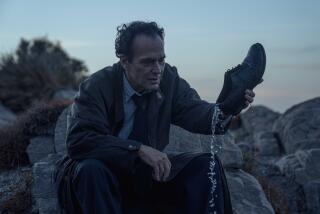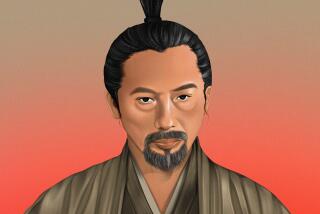Nagisa Oshima dies at 80; iconoclastic Japanese filmmaker
Nagisa Oshima, an iconoclastic Japanese director and screenwriter best known in the West for the sexually explicit films “In the Realm of the Senses” and “Empire of Passion,” died Tuesday at a hospital near Tokyo, his production company announced. He was 80.
Widely considered one of his country’s greatest filmmakers, Oshima died of pneumonia, according to the announcement from Oshima Productions, Japanese media reported. He had suffered a stroke more than a decade ago.
Oshima’s first film, “A Town of Love and Hope,” a searing depiction of the connections between poverty and crime, debuted in 1959. A former activist in postwar Japan’s left-wing student movement, he became known as one of a loosely tied group of filmmakers, the Japanese New Wave, who focused on such formerly taboo subjects as racism, sexual violence, the difficult position of immigrants in Japanese society and the devastating aftermath of World War II.
The uproar surrounding Oshima’s 1960 film “Night and Fog in Japan,” an indictment of the fractured state of the Japanese political left that was withdrawn days after its release, pushed him out of studio work and into his most furiously prolific period.
He made 17 films in the next dozen years, including “The Catch,” based on Kenzaburo Oe’s novel about an American soldier captured in a wartime Japanese village; “Death by Hanging,” about capital punishment and Japanese xenophobia, and “Boy,” the story of a child whose parents force him to fake traffic injuries to extort payments from unsuspecting drivers.
Oshima’s tightly wrought, passionately political films brought early comparisons to French director Jean-Luc Godard. (Weary of the notion, Oshima suggested that Godard be considered the Oshima of France.)
But it was the erotic, violent 1976 film “In the Realm of the Senses” that brought him global acclaim and controversy. Centering on one of Japan’s most notorious sex crimes, the film was drawn from the 1936 case of a maid who embarked on an intense, obsessive affair with her employer, then kills and castrates him at the height of their passion. Oshima edited the film in France to evade Japanese censors but was still put on trial for obscenity when he returned. He was eventually acquitted.
During the battles over the film, Oshima reinvented himself as a talk show host on Japanese television, advising housewives about their problems.
Returning to form in 1978, he won the best director award at the Cannes Film Festival for “Empire of Passion,” the story of adulterous lovers who murder the woman’s older husband, whose mournful ghost then haunts the pair.
Among his other films were 1983’s “Merry Christmas, Mr. Lawrence,” an English language prisoner-of-war drama starring British musician David Bowie and Japanese composer Ryuichi Sakamoto, and his final movie, the homoerotic “Taboo,” in 1999, about the declared and repressed desires at a samurai training school at the end of the Edo period.
Oshima was born March 31, 1932 in Kyoto to a family with samurai ancestry on his father’s side. He studied law and politics at Kyoto University, graduating in 1954. He went to work as an assistant director at Shochiku Ofuna Studios, then as a film critic and editor before making his first film.
He was married to actress Akiko Koyama, whom he directed in numerous films.
Throughout his career, Oshima sought to upend Japanese tradition and notions of morality, choosing rebels, outcasts and criminals as his protagonists. Ever the radical, he also engaged in a lifelong critique of Japanese society and film.
“My hatred for Japanese cinema includes absolutely all of it,” he once declared. Shunning the leafy beauty of many classic Japanese films, he also famously banned the color green from his movies because he found it too soothing.
More to Read
Start your day right
Sign up for Essential California for the L.A. Times biggest news, features and recommendations in your inbox six days a week.
You may occasionally receive promotional content from the Los Angeles Times.



















































